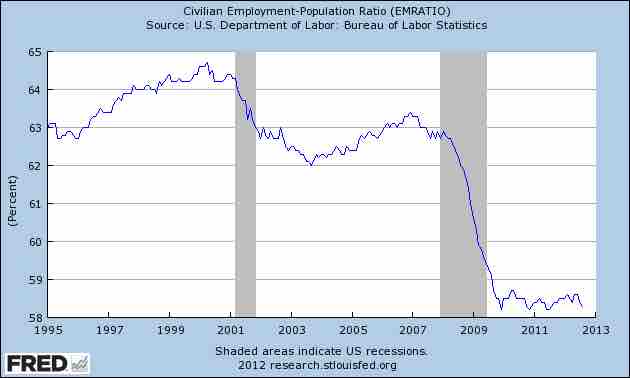Dismissal is the involuntary termination of an employee. It is colloquially referred to as being "fired." Dismissal implies employee fault, although this is not always the case. In most states, an employee can be fired for any reason or no reason at all, as long as they are not fired for a prohibited reason. Indeed, most dismissals are a by-product of economic conditions or organizational failure beyond the individual employee's control (i.e., layoffs).

U.S. unemployment, 1995-2012
Layoffs, particularly during recessions, are a common reason for employee dismissal. The recessions of 2001 and 2008 were both followed with drops in U.S. employment.
Reasons for Dismissal
Common reasons for dismissal include absenteeism, "time theft" offenses (i.e., improper use of breaks), incompetence, or poor job performance. Gross misconduct offenses, such as violence, serious negligence, repeated insubordination, fraud in the job application process (whenever it is discovered), harassment of co-workers, or drug use at work are grounds for immediate dismissal.
At times, even off-the-clock behavior can impact employment and result in a dismissal. For example, if an employee is convicted of driving while under the influence, s/he will not be able to keep a job that requires driving. Other offenses, even if unrelated to job performance, can be seen as a sign of unreliability on the part of the employee and can result in dismissal. Similarly, employees often represent organizations outside of work. It is bad PR for an organization's employees to be in trouble outside of work.
The Role of Human Resources
Dismissal is almost always the last step in a chain of disciplinary actions. Most workplaces recognize some sequence of disciplinary consequences, starting with verbal counseling, moving to written warnings and suspension, usually without pay.
In extreme circumstances, however, employees can be summarily dismissed. Regardless of the circumstances of the dismissal, organizations must document all infractions carefully and be consistent in their application of disciplinary measures including dismissal. Organizations that dismiss some employees for a particular infraction but not others leave themselves open to legal liability, even in right-to-work states.
Human resources departments are tasked with managing this process, and must ensure complete coordination of company policy with state or federal law. If the dismissal is seen as harassment-based or founded in discrimination, the organization's unethical acts will have significant legal ramifications and costs. Human resources professionals are mediators who must remain objective when assessing possible employee termination.